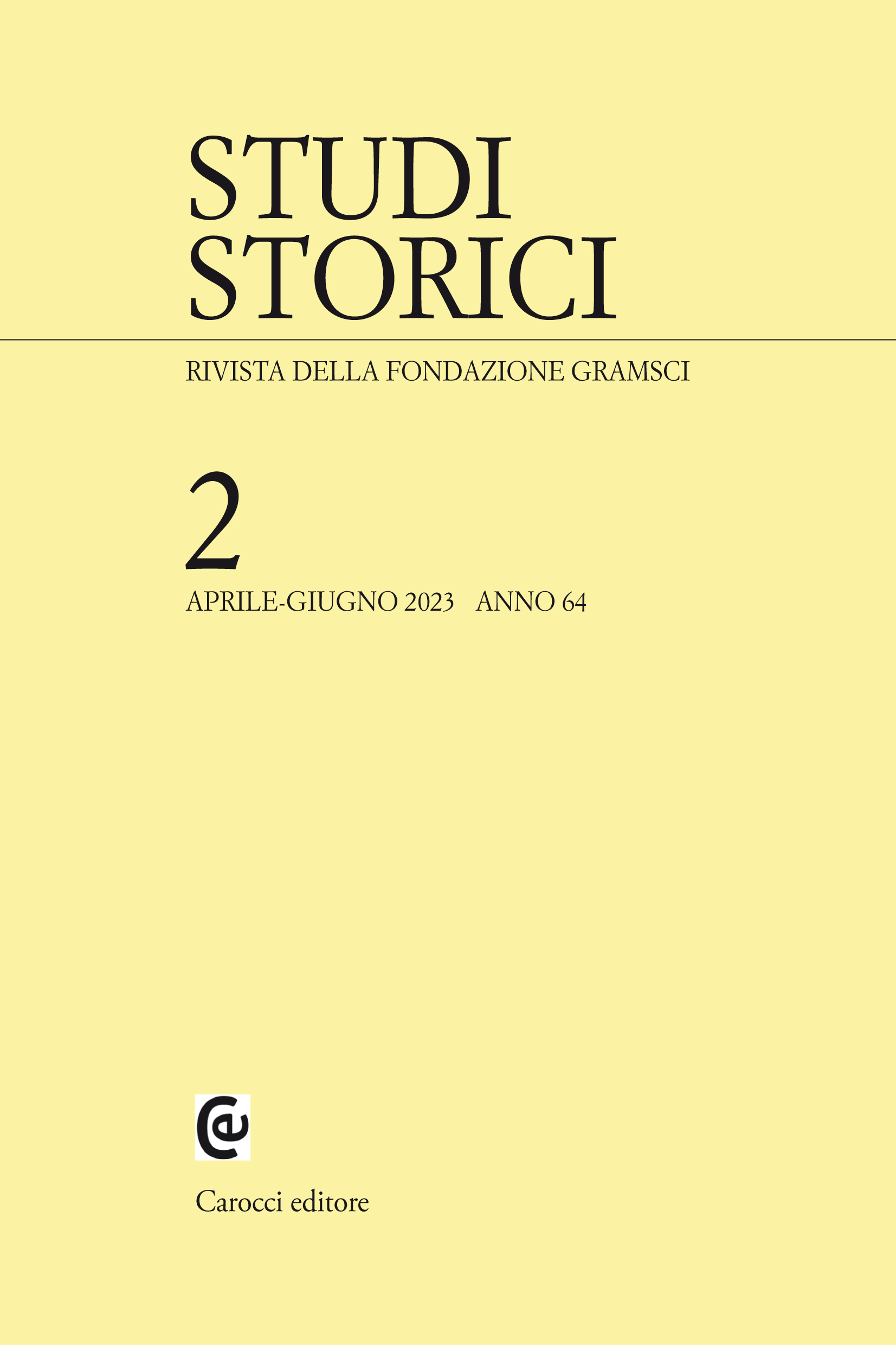
aprile - giugno 2023 anno 64
Sommario e abstract degli articoli
Umberto Roberto, pp. 261-288
I Vandali nella cultura dell’Europa moderna e contemporanea
The Vandals in the Culture of Modern and Contemporary Europe
This paper intends to focus on the negative judgement of the Vandals expressed both by contemporaries and in later centuries. To be sure, as a result of the conquest of Carthage in 439 and the occupation of the richest lands in Late Roman Africa, the Vandals dealt a lethal blow to the survival of the Western Roman Empire. And yet, such a negative portrayal of their character and accusations of senseless brutality that are already present in 5th century historiography should be considered as exaggerated. The bad reputation was greatly amplified when the term vandalisme was coined during the French Revolution. Furthermore, negative characteristics were attributed to the Vandals even by German historiography and culture during the 19th and 20th centuries. In recent years, the bad reputation and marginality attributed to the Vandals have been partly overcome through a research approach emphasizing their ability to maintain the prosperity and cultural splendour of Late Antique Africa under their rule.
Keywords: Vandals, Vandalism, Historical criticism, German historiography, Late Roman Africa.
Parole chiave: Vandali, Vandalismo, Critica storiografica, Storiografia tedesca, Africa romana tardoantica.
Ricerche
Riccardo Rosolino, pp. 289-314
Tra fedeltà e fiducia. Lo Stato, l’Inquisizione, le relazioni giurate
Between Fidelity and Trust. State, Inquisition, and Sworn Relation
In Early Modern Sicily, the introduction of the Spanish Inquisition, with its privilege of legal forum guaranteed to officials and family members in civil and criminal cases, had devastating effects on the functioning of justice and, indirectly, on the social and economic milieu based on fiduciary relations. In the 1590s, in order to mitigate its effects, consideration began to be given to establishing the waiver of the privilege of legal forum, to be used in the context of private law relations, limited to specific legal transactions. This did not happen peacefully. Inquisitor Luis de Páramo intervened to emphasise its legal groundlessness and political inappropriateness. For various reasons, the very role of the Spanish Inquisition in controlling the consciences and institutions of the Kingdom of Sicily was at stake. Two models of the state emerged in the harsh debate that followed: one innervated with sworn relations founded on loyalty; and another imagined by privileging its function of guaranteeing equally sworn relations founded on trust and respect for the logic of promise/expectation.
Keywords: Spanish Inquisition, Sicily, Justice, Privilege, Waiver.
Parole chiave: Inquisizione Spagnola, Sicilia, Giustizia, Privilegio, Rinuncia.
Elena Bacchin, pp. 315-343
Una «Siberia piemontese»? La deportazione degli esuli indesiderati negli anni Cinquanta dell’Ottocento
A «Piedmontese Siberia»? The Deportation of Unwanted Exiles in the 1850s
During the 1850s, in the very moment that it was presenting itself as a champion of liberalism and constitutionalism in the Italian peninsula, the Kingdom of Sardinia forcibly removed exiles who had been arrested for taking part in insurrections or who were considered dangerous. From April 1853 until March 1855, three boats transported to the United States refugees coming from other areas of the Peninsula, as a means to guarantee the security of the State, silence the opposition and prove to Austria the willingness to keep revolutionaries at bay. However, the landing in New York of these refugees, neither charged nor sentenced, created issues related to the international law, the status of the transportees, and policies of immigration. Piedmont was accused of seeking to transform the United States into a penitentiary colony.
Keywords: Kingdom of Sardinia, Deportation, Unwanted exiles.
Parole chiave: Regno di Sardegna, Deportazione, Esuli indesiderati.Spagnola, Sicilia, Giustizia, Privilegio, Rinuncia.
Chiara Giorgi, pp. 345-376
Politica e salute. La sanità italiana nella crisi del welfare
Politics and Health. Italian Healthcare in the Welfare Crisis
This article investigates the trajectory of Italy’s health policies since the 1980s, highlighting the contradictory dynamics between the universalist and public approach of the reform that created Italy’s National Health Service in 1978, and the subsequent policies that aimed to scale down public services. The international context of the 1980s was marked by the rise of a selective approach to health, in sharp contrast with the original spirit of the reform. Italy’s policies were characterised by difficulties in implementing the reform – in terms of planning, budgets, and organisational models – and by interventions in the 1980s and 1990s that aimed to introduce a managerial approach, stronger budget constraints, and greater regional authority, as well as to open up space for market services. The Italian experience shows unique traits that can be traced back to the historical evolution of its welfare state and to the country’s social, economic, and political dynamics, leading to a puzzling mismatch between the drive to implement one of the most advanced health reforms in Europe and the pressure to retrench and recalibrate health and welfare policies.
Keywords: Health policies, Healthcare, History, Italy, Welfare.
Parole chiave: Politiche della salute, Sanità, Storia, Italia, Welfare.
Opinioni e Dibattiti
Saverio Di Franco, pp. 377-407
Sul «popolo civile» di Napoli (secc. XVI-XVII)
On the «Popolo Civile» of Naples (16th-17th Centuries)
The purpose of this work is to observe and understand the values that early modern thinkers, historians and scholars attributed to the ideas of «people» and «civilization.» The analysis was carried out using the most up-to-date studies and philological tools, which have made it possible to give the terms «plebs,» «people,» and «civilization» a meaning consistent with the social and institutional context: the formae mentis and political ideas that spread in Naples between the 16th and 17th centuries. From the dialogue between the sources, it appears clear that the people were not a homogeneous body and their identity cannot be identified with a specific social group. The people were a composite aggregate, in which there existed a remarkable variety of interests, often divergent, expressing completely irreconcilable viewpoints of the world and society.article investigates the trajectory of Italy’s health policies since the 1980s, highlighting the contradictory dynamics between the universalist and public approach of the reform that created Italy’s National Health Service in 1978, and the subsequent policies that aimed to scale down public services. The international context of the 1980s was marked by the rise of a selective approach to health, in sharp contrast with the original spirit of the reform. Italy’s policies were characterised by difficulties in implementing the reform – in terms of planning, budgets, and organisational models – and by interventions in the 1980s and 1990s that aimed to introduce a managerial approach, stronger budget constraints, and greater regional authority, as well as to open up space for market services. The Italian experience shows unique traits that can be traced back to the historical evolution of its welfare state and to the country’s social, economic, and political dynamics, leading to a puzzling mismatch between the drive to implement one of the most advanced health reforms in Europe and the pressure to retrench and recalibrate health and welfare policies.
Keywords: People, Civilization, Kingdom of Naples, Political institutions, Political thought.
Parole chiave: Popolo, Civilizzazione, Regno di Napoli, Istituzioni politiche, Pensiero politico.
Andrea Lanza, pp. 409-435
Una religione della prassi. Sull’apparente misticismo del primo socialismo francese
Religion of Praxis. On the Alleged Mysticism of the Early French Socialism
In the 1840s, groups of workers and intellectuals (i.e. Leroux, Buchez, Cabet), especially in Paris, began for the first time to use the term «socialism» to define themselves. Most of these socialists combined social and political resolutions with a genuinely religious discourse; in the wake of the Saint-Simonians, socialism most often coincided with a «religion of humanity». As this article contends, the religious dimension of early French socialism responded to different requirements: the naturalness of «religious feeling», the organization of moral reformation, and the guarantee of social unity. According to this early socialism, religion is also the form of humankind’s self-consciousness. Precisely because of this plurality of aspects, the «religion of humanity» constituted a tool for conceiving a self-transformation of society in historical time; in other terms, it was a religion of praxis.
Keywords: Socialism, 19th-century France, Religion of Humanity, Pierre Leroux, Saint- Simonism.
Parole chiave: Socialismo, Francia dell’800, Religione dell’umanità, Pierre Leroux, Sansimonismo.
Forum: Il ritorno di Martin Guerre
Pasquale Palmieri, pp. 437-441
Presentazione
The Return of Martin Guerre by Natalie Zemon Davis, on the Book’s 40th Anniversary
One of the most important and successful historiographical works of the 20th century celebrates its 40th anniversary in 2023: The Return of Martin Guerre by Natalie Zemon Davis. It was first published by Harvard University Press in 1983. Four Italian scholars address crucial questions on the methodological insights that this book still offers in various fields of the humanities and social sciences. Lisa Roscioni explains how historical writing interacts with the historical method (Rereading The Return of Martin Guerre today). Fabio Dei’s contribution deals with the relationship between Martin Guerre and the Peasant World. Fernanda Alfieri focuses on The Reasons (and Feelings) of Bertrande de Rols (the female protagonist of Zemon Davis’ essay). Finally, Ottavia Niccoli’s essay is about Martin Guerre […] between History and Cinema.
Keywords: Martin Guerre, Natalie Zemon Davis, Cinema, Popular Culture, Historical Writing.-century France, Religion of Humanity, Pierre Leroux, Saint- Simonism.
Parole chiave: Martin Guerre, Natalie Zemon Davis, Cinema, Cultura popolare, Scrittura storica.
Note critiche
Gian Giacomo Ortu, pp. 475-488
Il Parlamento Vivas del 1624 e gli «Acta Curiarum Regni Sardiniae»
The Vivas Parliament of 1624 and the «Acta Curiarum Regni Sardiniae»
This article reflects on the book Il Parlamento del viceré Giovanni Vivas (1624), edited by A. Argiolas e A. Mattone, Cagliari, Consiglio regionale della Sardegna, 2020.
Keywords: Parliamentarism, Pactism, Autonomy, Fiefdom, Rural Community.
Parole chiave: Parlamentarismo, Pattismo, Autonomia, Feudo, Comunità rurale.
Luca Iori, pp. 487-505
Arnaldo Momigliano in Giappone
Arnaldo Momigliano in Japan
This article deals with the book Rekisigaku o rekisigaku suru (Fare storia della storiografia), Tokyo, Misuzu Shobo, 2021, a recent anthology of writings on ancient and modern historiography by Arnaldo Momigliano, edited and translated into Japanese by Akira Koba, Professor Emeritus of Roman Law at the University of Tokyo.
Keywords: Arnaldo Momigliano, Akira Koba, Greek and Roman History, Ancient and Modern Historiography, History of Classical Scholarship in Japan.
Parole chiave: Arnaldo Momigliano, Akira Koba, storia greca e romana, storia della storiografia, storia degli studi classici occidentali in Giappone.
Sfoglia gli altri numeri dell’anno 64 / 2023
Elenco dei fascicoli pubblicati dal 2010
Seleziona fascicolo...
- anno 65 / 2024
- 1
- 2
- anno 64 / 2023
- 1
- 2
- 3
- 4
- anno 63 / 2022
- 1
- 2
- 3
- 4
- anno 62 / 2021
- 1
- 2
- 3
- 4
- anno 61 / 2020
- 1
- 2
- 3
- 4
- anno 60 / 2019
- 1
- 2
- 3
- 4
- anno 59 / 2018
- 1
- 2
- 3
- 4
- anno 58 / 2017
- 1
- 2
- 3
- 4
- anno 57 / 2016
- 1
- 2
- 3
- 4
- anno 56 / 2015
- 1
- 2
- 3
- 4
- anno 55 / 2014
- 1
- 2
- 3
- 4
- anno 54 / 2013
- 1
- 2
- 3
- 4
- anno 53 / 2012
- 1
- 2
- 3
- 4
- anno 52 / 2011
- 1
- 2
- 3
- 4
- anno 51 / 2010
- 1
- 2
- 3
- 4
